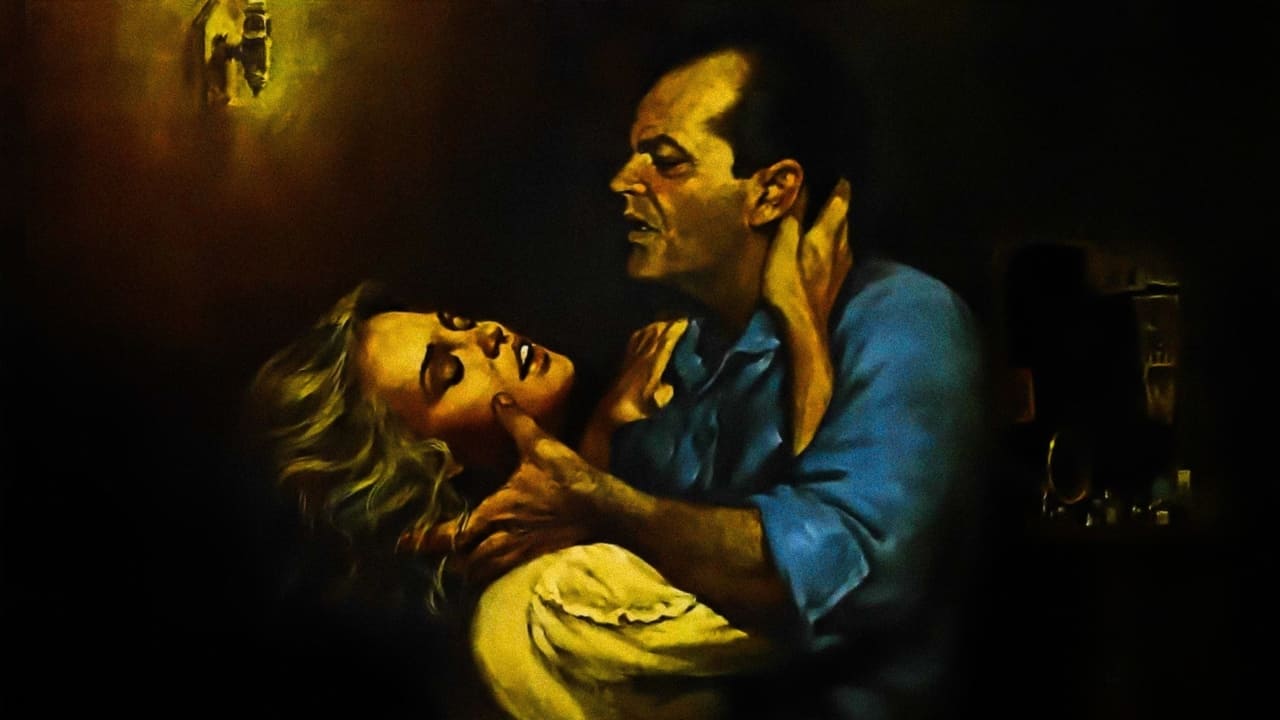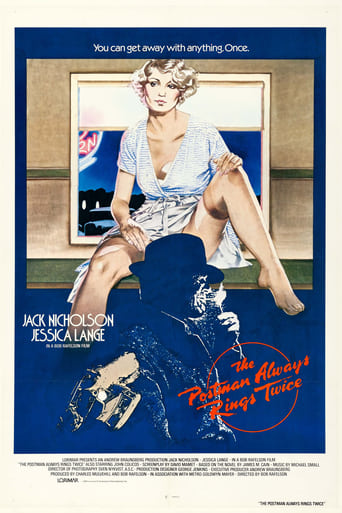Fairaher
The film makes a home in your brain and the only cure is to see it again.
Tayloriona
Although I seem to have had higher expectations than I thought, the movie is super entertaining.
Yash Wade
Close shines in drama with strong language, adult themes.
Billy Ollie
Through painfully honest and emotional moments, the movie becomes irresistibly relatable
brchthethird
While it is a well-made film on a technical level and all of the performances were excellent, there was a certain something missing from this remake that left me wanting. Based on the novel by James Cain, the story is about a drifter, Frank Chambers (Jack Nicholson), who visits a rural diner run by Nick Papadakis and his wife Cora (Jessica Lange). Frank and Cora begin an affair and then attempt to kill Cora's husband, but fail. In true film noir fashion, fate eventually gets its way and tragedy befalls the two lovers in an unexpected way. For me, the 1946 film adaptation starring John Garfield and Lana Turner stands as one of the best film noirs ever, and there was almost nothing this 1981 remake could have done to really live up to that. The only new or different thing this adaptation does is ramp up the sexual content and violence, and mixes them in a way that was kind of off-putting at times. Perhaps it was this way in Cain's novel, but the way in which sex and violence are intertwined in this film was more than a little disturbing. With that, and a slight adjustment to the ending (and of course, being in color), it hews fairly closely to the story as presented in the 1946 original. One might ask, "What was the point?" and you'd be perfectly justified in asking that. I have no idea what possessed them produce this remake, but for what it's worth it's not a bad film. However, if forced to choose between this and the 1946 version, I'd pick the 1946 version every time. This one was just a little too nihilistic and lacked emotional depth.
seymourblack-1
It's easy to understand how attractive it must have seemed to make a 1980s movie of "The Postman Always Rings Twice". James M Cain's famous depression-era melodrama had already been successful as a book (1934) and a movie (1946) and a 1980s version could obviously benefit from the advantages of being made in colour and at a time when censorship constraints would be far less strict than they had been in 1946. The result is a production in which this story of lust, adultery, murder, blackmail and "the hand of fate" is told in a style which is far more raw, gritty and explicit than the 1946 movie.Frank Chambers (Jack Nicholson) is a drifter who stops for a meal at a remote countryside diner / filling station somewhere outside L.A. and decides to stay a little longer after catching sight of the establishment's attractive cook called Cora (Jessica Lange). Cora's the wife of Nick (John Colicos) who's the considerably older Greek proprietor of the business. Nick offers Frank a job as a mechanic and soon Cora and Frank are involved in a passionate affair.After the couple fail in an attempt to run away together, they decide to murder Nick. They succeed at the second attempt but soon Cora is put on trial for the crime. The prosecuting attorney succeeds in getting Frank to betray Cora but some slick work by her lawyer results in her being acquitted. After the trial, Frank and Cora resume their relationship and a succession of surprising developments culminate in a tragic conclusion.Frank is a man whose misfortunes don't simply emanate from his weakness or the consequences of making a wrong turn in his life. He's a violent, petty criminal who's driven by lust, but nevertheless, seems more in control of his destiny than is typical of a noir protagonist. In this version of the story, in an interpretation which is probably more realistic, he's more cynical and brutal than John Garfield's 1946 incarnation and as a result is a far more unsympathetic character.Jessica Lange's Cora is also different from Lana Turner's as she seems much too strong and spirited to be as trapped as she claims and also doesn't have the kind of mystique or ambiguity which makes it seem credible that she could've been harbouring dark thoughts about killing Nick for some time.The ways in which the characters of Frank and Cora have been changed is interesting to watch but the same can't be said of the changed ending which lacks both the irony of the original and its significance to the story's title.This movie is strong on atmosphere and intensity and convincingly evokes the period in which the action is set. Jack Nicholson and Jessica Lange are excellent in their roles and the supporting cast (particularly John Colicos) is also very good.
Rodrigo Amaro
Yes, this story was told a few times in the past, being one of the versions the classic of same title starring Lana Turner and John Garfield, one of the most acclaimed stories of all time "The Postman Always Rings Twice" becomes a sexy, romantic and sad tale on the hands of Bob Rafelson ("The King of Marvin Gardens"), yet this work resurrected the film noir genre in the 1980's, giving new forms, exploring a more sexual and violent side which wasn't possible to be presented in the golden era of noir.With the same story as the 1946 adaptation of James M. Cain's novel, the film stars Jack Nicholson as Frank Chambers, the drifter who fell in love with Cora Papadakis (Jessica Lange), a simple housewife who helps her husband Nick (John Colicos) to manage a roadside diner in the East Coast. But they have a plan to kill Nick and live together forever but the destiny has some tricks, up's and down's, twists and turns to make their lives complicated each time their plot fail again and again. The difference between the seductive and classic version of this same story is the approach given by writer David Mamet, who made the love story between these two characters something sexy, animalistic, a full exploration of the senses with a lustful couple ripping each other's clothes, having sex on a kitchen table (one of the most iconic moments of the 1980's), something almost gratuitous but very effective for most audiences nowadays. While Tay Garnett's version was a provocation that could never go too far in its sensuality, only showing short kisses but very effective tender moments, this update is more of a visual film made to present something exciting, thrilling. And Nicholson and Lange have the chemistry and quality in their wild performances here.To me, comparing back to back both films they're equally great just as the novel. They have their differences, specially concerning about the characters characterization and performances of actors, the way they were written. Examples: Nicholson is more believable as a hobo than John Garfield, in the way he's dressed, the way he talks and moves; the Cora played by Lange was something new, more passive and quite joyful which is nothing similar than the one of the book and 1946 film materials, who is very smart, dominating in the relationship with Frank; but the most striking difference was the friendly Nick, played here as an rude and irritating man, therefore, the script is basically giving a reason for us not like this guy and cheer that the horrible plans of Frank and Cora become successful. The George C. Scott rule of not giving awards to actors unless the play the same parts is useful here to see in which films the acting worked better. If only we could team Jack Nicholson and Lana Turner together....we would have something explosive and very interesting. On a minor look to the film, I really enjoyed the ending with a devastating moment, without the trial and that whole depressive conclusion (although it ended sad the same way, but this time the viewers will make their own conclusions instead of having the title explained at the final and moralistic scene as MGM's version). Also enjoyed Sven Nykivst colorful cinematography with a right use of darkness in the most tense moments. The melodramatic soundtrack works one time or the other but for the most of the film is just silly. The importance of this version of "The Postman Always Rings Twice" is the fact that it brought back the film noir with a new style, new faces (ok, Nicholson was in "Chinatown" in 1974, so it doesn't count) and more baldness. After this film, we had "Body Heat", the parody/homage "Dead Men Don't Wear Plaid", and plenty of others. Take a look and enjoy it. 10/10
JoeytheBrit
Wasn't there some significance to the title in James Cain's novel and the 1946 movie version? It's a long time since I visited either so I can't be certain, but I seem to remember the postie's propensity for ringing twice was at least referred to. Unless I missed it, it gets nary a mention in this lethargic 1981 remake of the original, making the title somewhat meaningless.Anyway, Jack Nicholson reins in his trademark rakish, devilish attitude to play the role of the drifter (previously played by John Garfield) who conspires with luscious housewife and gas station-diner cook Jessica Lange to do away with her annoying Greek husband, Nick. Nick takes his wife for granted; he has a Stavros accent and buys himself silk nightgowns and so deserves to die. Jack and Jessie make a convincing couple – probably more so than Garfield and Lana Turner, although that's the only respect in which this version surpasses the original. Their attraction is animal, their love-making more of an adversarial duel than a demonstration of intimacy as they tear at each other on the diner's kitchen table. It's easy to see why Cora falls for Frank, even as his ardour cools. He offers a way out from the drudgery of her life with Nick. But for Frank you always get the impression (until the end at least) that it's more about the sex, and that he never really knows what he wants.The story is slow in unfolding, but drags fatally once the killer couple get away with their crime. Perhaps that's deliberate, to demonstrate the aimlessness of their relationship – or of any relationship that isn't fuelled by love. The couple blow hot and cold with each other as they wait for Cora's brief probation period to be over so that they can move away from the scene of their crime. You get the impression that, if Cora's life hadn't been cut short, they would have ended up either destroying one another or drifted aimlessly through life long after any love they feel has been extinguished, wondering why the hell they stay together. Either way, you don't really care that much whether their end is happy or tragic.If you have a choice, watch the original (or the Italian movie, Ossessione, another version). If you don't, this one's OK but it's nothing special.

